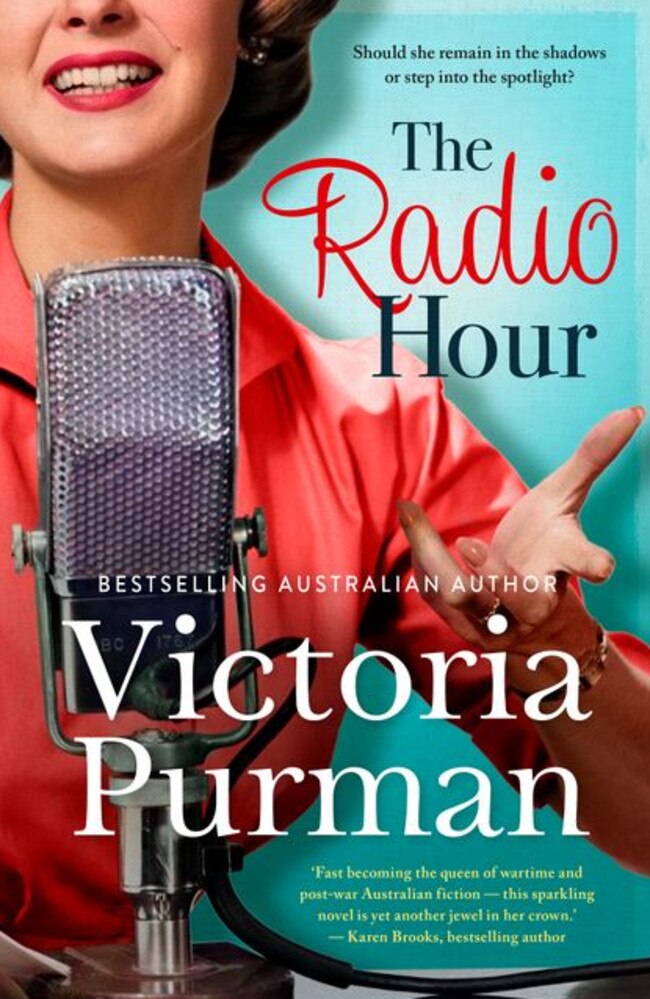The Golden Age of radio, a legend called Gwen and a very familiar fear
Worried our reliance on screens will mean people stop reading and kids forget how to play? Aussies have been there before, a fascinating new book reveals – and look what happened.
Books
Don't miss out on the headlines from Books. Followed categories will be added to My News.
For twenty seven years, it was the radio serial that stopped a nation.
Every weekday, at 1pm, listeners all over Australia would gather around their radios to listen to the ABC’s Blue Hills.
When it’s famous opening theme – Pastorale, by Ronald Hanmer – floated into kitchens and living rooms, into workplaces and farmsheds, people put down their brooms and their tools and tuned in to hear the latest adventures of the residents of Tanimbla, the fictional country town in which the series was set.
It was repeated in the evenings for those who couldn’t tune in during the day and it’s estimated that at its most popular, half of Australia’s radios were tuned in to the drama.

The creator of this historic Australian serial was Gwen Meredith, a writer, dramatist, and playwright, and a legend in broadcasting and in the Australian arts.
For the five years before Blue Hills, she’d written The Lawsons, a serial about the plight of rural Australians during the war and it was much loved by audiences.
In 1949, she created Blue Hills, featuring some spin-off characters, and it endured for 27 years. The final episode aired on 30 September, 1976, with the esteemed actor Queenie Ashton’s character Grannie Bishop, having the final words. (Ashton worked on the serial from the very first episode.)
“We don’t have to see or hear people every day of the week to imagine them in our surroundings, even to live their lives with them. And so, you see, it isn’t really so very hard to say goodbye, and God Bless.”

Meredith wrote each and every one of Blue Hills’ 5,795 episodes and, no doubt because of the enormous workload she was managing, in subsequent years, the serial dropped down to four days a week.
Meredith retired when Blue Hills ended and died at her home in Bowral, NSW on 3 October 2006, aged 98. She was recognised twice for her services to the Arts, with an MBE in 1967 and later an OBE in 1977.
I am just too young myself to have listened to Blue Hills when it was on air but when I was hunting around for ideas for my next novel, I came across a reference to the serial and went down a rabbit hole to explore its success.
What I discovered was that the golden age of radio broadcasting was slowly being overshadowed by the arrival of television.

I decided to set my book The Radio Hour in 1956, just before television begins broadcasting in Australia (planned to coincide with the Melbourne Olympics) to reflect the huge change broadcasting was about to undergo.
My main character, a fifty-year old ‘spinster’, Martha Berry, is tasked to work as a secretary for the producer and writer of a new radio serial created to follow in Blue Hills’ successful footsteps.
What she discovers is that the new producer is a young man totally out of his depth, forcing hew to step in and by whatever means necessary, rescue the serial from impending cancellation.
It was a critical time in the history of Australian radio. Those who worked in it were, at first, certain that television would be nothing but a conduit for mediocrity and vulgar sensationalism and that it wouldn’t take off in Australia.

There were suspicions that children would develop such strong addictions to television that they would forget how to run and play. Some believed the population might even stop reading.
I have one of my characters voice those concerns by saying, “People will always want their radio. You can bet on that.”
I started my career in radio in 1984, as a cadet journalist in the radio newsroom at the ABC in Adelaide so perhaps that’s why I continue to have such an affection for it.
Radio has been a part of Australians’ lives for a hundred years and just as my character in The Radio Hour predicted, people will always want their radio.
According to Deloittes’ annual Media and Entertainment Consumer Insights report 2023, Australians spend an average of seven hours a week listening to music or radio.
The ABC reports that more than five million people listen to their radio stations each week, and statistics show that commercial radio has more than thirteen million listeners each week across the country.

And when we need it the most, radio is always there. In natural disasters, Australians tfrom coast to coast tune in to their local radio in droves to hear the latest updates and safety information from authorities.
The way we’re listening to audio is changing, with podcasts now more popular than ever. The bonus is that, like streaming television, we can listen to them when it suits us.
I like to believe that listening is more popular then ever in Australia – whether it be radio, podcasts or audiobooks. People will always want their radio. You can bet on that.
The Radio Hour by Victoria Purman is out now, published by HQ Fiction.
Tell us what you think at the Sunday Book Club on Facebook.
And check out our new Book of the Month, Rachael Treasure’s Milking Time. Get it for 30% off the RRP with the code TREASURE at Booktopia. T & Cs: Ends 31-May-2024. Only on ISBN 9781460757598. Not with any other offer.
More Coverage
Originally published as The Golden Age of radio, a legend called Gwen and a very familiar fear



